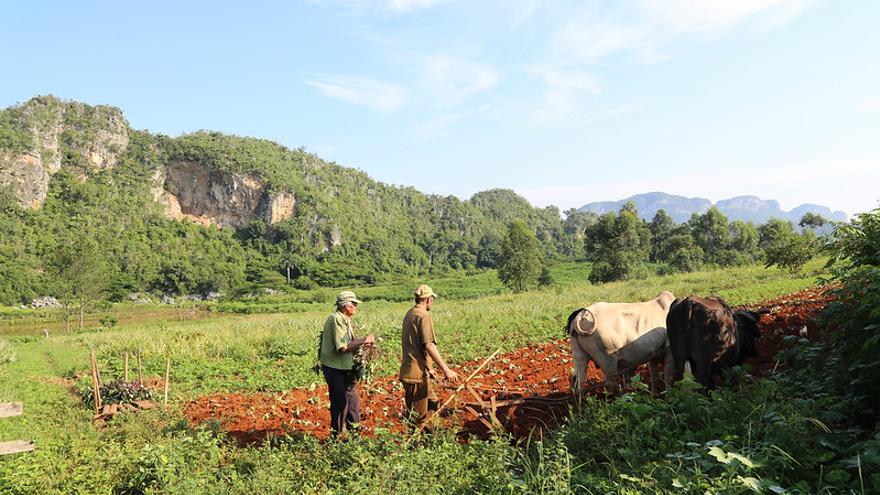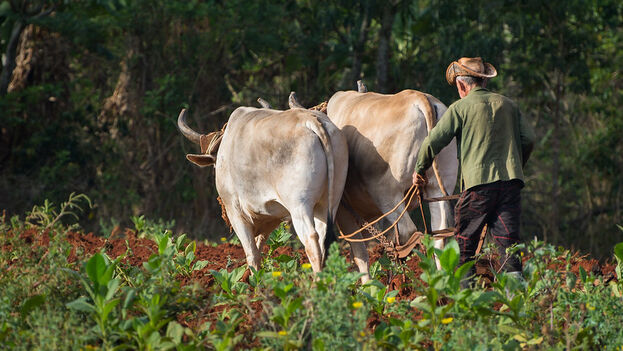
14ymedio, Havana, July 9, 2020 — Beginning now, the campesinos (farmers) who are members of farming cooperatives will be responsible for supplying the bodegas (ration stores) in their region. According to what several of them told 14ymedio in the province of Pinar del Rio, the farmers must take 30 pounds of food for each consumer to the nearby bodegas.
An employee of the administration of the Hermanos Saíz cooperative in Pinar del Rio confirmed the implementation of this measure, which would apply to the whole national territory. “These are times of sharing the little that we have and for the community to involve itself more,” he clarified to this newspaper. “We are reuniting with the campesinos and explaining the difficulties of the moment to them, and up to now, all have committed themselves to supplying the bodegas”.
“Yesterday we had a meeting with the First Secretary of the Communist Party of the cooperative, and he told us that we have to supply part of the food to the bodegas near our fields,” Roberto, a farmer and proprietor of a farm in San Juan y Martínez (Pinar del Río) told us.
He warns that “If there isn’t food in our town, it’s the fault of the 15 or 20 campesinos with farms who live nearby.” The measure was announced to the farmers on the tour that José Ramón Machado Ventura, the Second Secretary of the Communist Party (PCC), is making across the Island.
Machado Ventura got together with the First Secretaries of the PCC in each province and also with municipal Party authorities to communicate the decisions taken in the face of the supply crisis that is happening in the country. “He’s giving a policy talk, mentioning the international situation and Donald Trump, and he calls for planting everything that can be planted,” comments Roberto.
“But there’s no fuel, no supplies, no fertilizer, and the Government doesn’t contribute anything,” he complains. In the meeting held this week in the cooperatives of San Juan y Martínez, they were told that “if the campesino achieves a harvest, 80% will go to the State and 20% to him,” because “they have to guarantee food for the people and avoid imports.”
Roberto, who owns his land and has been a member of a cooperative for two decades, explains that if he manages to harvest 1,000 ears of corn, he must give 800 to the State so they can distribute it “with very low prices, because they pay .80 Cuban pesos (~3¢ US) for each ear, although it’s the highest quality, and in the street we can sell it for 2 or 3 Cuban pesos (8 to 12 cents US).”
“This is feudalism,” concludes this campesino. He graduated in agricultural engineering and belongs to a long line of producers of meat, fruit and grain. “They are counting the number of people on each farm in order to calculate how much food for self-consumption can stay with the farmer, but they’re acting like they’re doing us a favor to leave something.”
The Ministry of Agriculture has distributed a list for each Cooperative of Credits and Services (CSS) and Cooperative of Agricultural Production (CPA) with the number of users inscribed in the closest bodega. “Now the 30 pounds per capita is the responsibility of the campesinos who form part of these cooperatives.”
“Inside every cooperative they have assigned quantities for each farmer, who is required very month to bring to the store meat, vegetables and fruit, but it’s expected that soon this will also include rice and beans,” says the campesino. “For example,I have to supply 12 families, and I don’t know how I’m going to do that.”
The residents in the zone who aren’t farmers but buy in the rationed market fear that this is the preamble to eliminating the quota of rice, mainly imported, which is sold through this system. “Here people sense that the next thing is that the State won’t send anything more to the ration stores.”
“I don’t know, what’s the Government going to do? If they’re saying that everyone who has a yard has to grow pumpkins and pineapple, and now they tell us that we are the ones who are going to supply the bodegas, then what are they going to take care of?” he questions.
Carlos Manuel, a neighbor in the same location, has a lot of doubts. “Now they’ve created a system of paying by invoice for this method; if I have two bunches of bananas, I have to go to the bodega to deliver them, and they give me an invoice to collect in the bank, in less than 72 hours they say, but no one believes them because they’ve owed us money from the harvest for several months now that they haven’t paid.”

“If there’s a moment of overproduction, which is unlikely because the drought is affecting us a lot this year plus there’s almost no fuel, then we can be left with the extra if the State isn’t interested,” he adds. “The only thing that’s going to happen is to take away more enthusiasm from the farmers, who are already very upset with everything that’s happening.”
“Every year they try to get us to commit to something, and eventually tons of forms are filled out, but the food exists only in the reports and formal commitments that no one fulfills, and it isn’t achieved or guaranteed,” says Carlos Manuel with skepticism. “We farmers here are waiting for the waters of failure to calm, but for now we have to bring something to the bodega in order to comply and not be singled out.”
For years there has been speculation about the end of rationing in Cuba, a system of distribution created in 1963. The officials have repeated on several occasions that it’s preferable “to subsidize people and not products”, but the rationed quota still is given to every citizen equally, even to those who have a level of income that is higher than the average.
Rice, grains, oil, sugar, salt, eggs, chicken and bread are some of the foodstuffs that are still subsidized, while other goods have been removed from the ration book, among them liquid detergent, bath and laundry soap, toothpaste, beef and cigarettes.
With the arrival of the pandemic in Cuba, some products, like sausage or frozen chicken, which before were sold in the free market, have returned to the ration book.
Translated by Regina Anavy
________________
COLLABORATE WITH OUR WORK: The 14ymedio team is committed to practicing serious journalism that reflects Cuba’s reality in all its depth. Thank you for joining us on this long journey. We invite you to continue supporting us by becoming a member of 14ymedio now. Together we can continue transforming journalism in Cuba.
